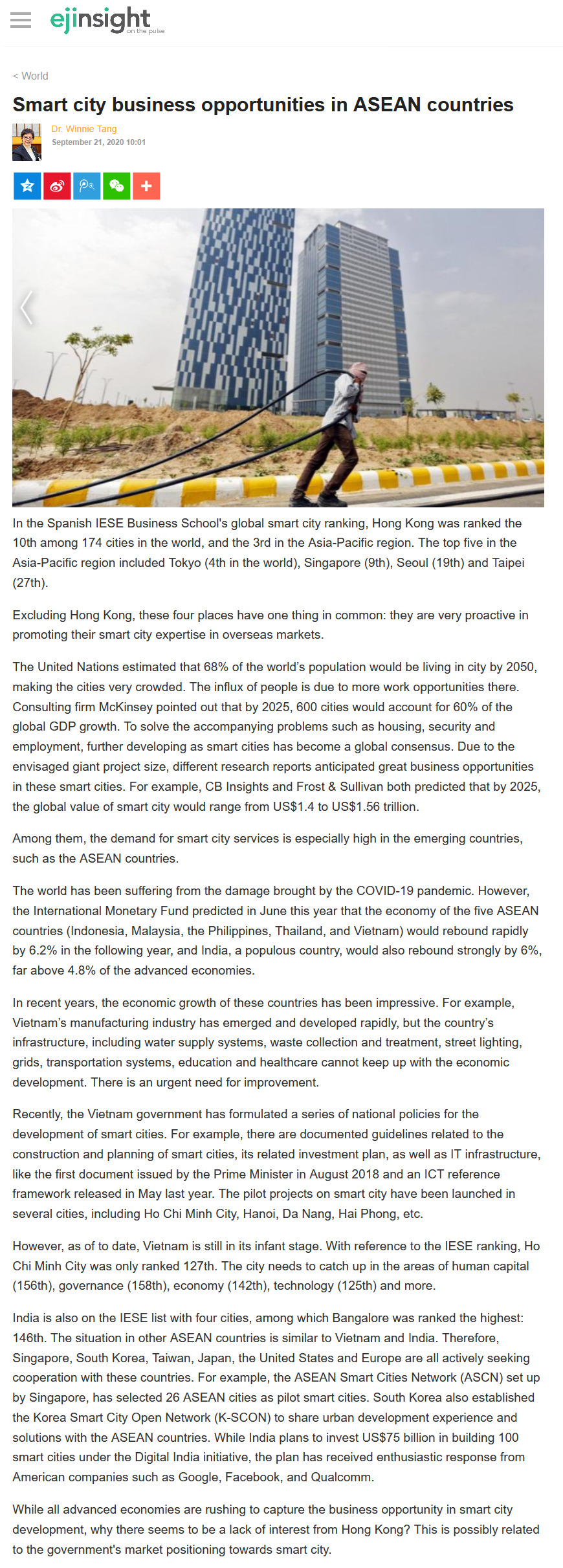網上版請按此

Smart city business opportunities in ASEAN countries
In the Spanish IESE Business School's global smart city ranking, Hong Kong was ranked the 10th among 174 cities in the world, and the 3rd in the Asia-Pacific region. The top five in the Asia-Pacific region included Tokyo (4th in the world), Singapore (9th), Seoul (19th) and Taipei (27th).
Excluding Hong Kong, these four places have one thing in common: they are very proactive in promoting their smart city expertise in overseas markets.
The United Nations estimated that 68% of the world's population would be living in city by 2050, making the cities very crowded. The influx of people is due to more work opportunities there. Consulting firm McKinsey pointed out that by 2025, 600 cities would account for 60% of the global GDP growth. To solve the accompanying problems such as housing, security and employment, further developing as smart cities has become a global consensus. Due to the envisaged giant project size, different research reports anticipated great business opportunities in these smart cities. For example, CB Insights and Frost & Sullivan both predicted that by 2025, the global value of smart city would range from US$1.4 to US$1.56 trillion.
Among them, the demand for smart city services is especially high in the emerging countries, such as the ASEAN countries.
The world has been suffering from the damage brought by the COVID-19 pandemic. However, the International Monetary Fund predicted in June this year that the economy of the five ASEAN countries (Indonesia, Malaysia, the Philippines, Thailand, and Vietnam) would rebound rapidly by 6.2% in the following year, and India, a populous country, would also rebound strongly by 6%, far above 4.8% of the advanced economies.
In recent years, the economic growth of these countries has been impressive. For example, Vietnam's manufacturing industry has emerged and developed rapidly, but the country's infrastructure, including water supply systems, waste collection and treatment, street lighting, grids, transportation systems, education and healthcare cannot keep up with the economic development. There is an urgent need for improvement.
Recently, the Vietnam government has formulated a series of national policies for the development of smart cities. For example, there are documented guidelines related to the construction and planning of smart cities, its related investment plan, as well as IT infrastructure, like the first document issued by the Prime Minister in August 2018 and an ICT reference framework released in May last year. The pilot projects on smart city have been launched in several cities, including Ho Chi Minh City, Hanoi, Da Nang, Hai Phong, etc.
However, as of to date, Vietnam is still in its infant stage. With reference to the IESE ranking, Ho Chi Minh City was only ranked 127th. The city needs to catch up in the areas of human capital (156th), governance (158th), economy (142th), technology (125th) and more.
India is also on the IESE list with four cities, among which Bangalore was ranked the highest: 146th. The situation in other ASEAN countries is similar to Vietnam and India. Therefore, Singapore, South Korea, Taiwan, Japan, the United States and Europe are all actively seeking cooperation with these countries. For example, the ASEAN Smart Cities Network (ASCN) set up by Singapore, has selected 26 ASEAN cities as pilot smart cities. South Korea also established the Korea Smart City Open Network (K-SCON) to share urban development experience and solutions with the ASEAN countries. While India plans to invest US$75 billion in building 100 smart cities under the Digital India initiative, the plan has received enthusiastic response from American companies such as Google, Facebook, and Qualcomm.
While all advanced economies are rushing to capture the business opportunity in smart city development, why there seems to be a lack of interest from Hong Kong? This is possibly related to the government's market positioning towards smart city.
Dr. Winnie Tang
Adjunct Professor, Department of Geography, Faculty of Social Sciences and Faculty of Architecture, The University of Hong Kong